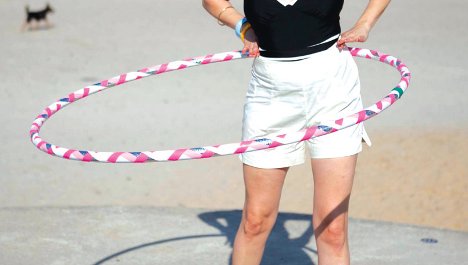Old world in Neukölln
When the hurly-burly of Karl-Marx-Straße starts to become overwhelming, salvation lies at the foot of Körnerpark’s ivy-clad staircases, where 2.4 acres of serene greenery and the Café im Körnerpark awaits. Bequeathed by owner Franz “Ozymandias” Körner on condition it continued to bear his name, the former gravel pit drops up to seven metres below street level, walling out the blare of Neukölln amidst bird trills and babbling water. Once an archaeological site of note after the excavation of a 5th-century vaulted grave of a horse and rider, the neo-Baroque villa is today all cement balustrades, long manicured lawns and cascading jet fountains, complete with naked Turkish bubs paddling in the fountains beside their cherubic stone twins. Planted in the park’s western corner, the café plays weekend watering hole to Neukölln’s otherwise invisible yuppie presence. They can be seen lazing back with weekend newspapers, beers and watery cappuccinos (€2.30) from the Orangerie’s shaded, gravel terrace. Inside are a gallery and more tables offering rather average fare, but for a bit of old-world refuge away from the multicultural buzz of Karl-Marx-Straße, this place is a true find.
CAFE IM KÖRNERPARK|Schierker Str. 8, Neukölln, U+S-Bhf Neukölln, Tue-Thr 10-20, Fri-Sun 10-22
Temporary culture factory
If you go down behind the elevated Wedding S-Bahn station, you’ll find yourself in the courtyard of an old safe factory. Today you’re more likely to hear noisy guitars, howls and shouts from a theatre ensemble or a rumbling coffee machine. In the beginning of May, Christophe Knoch, who previously worked with Christoph Schlingensief on his Burkina Faso Opera Village, came across the space and immediately fell for it. He hunted down the owner and convinced him to rent out the building. Soon after, Knoch moved in and started the Mica Moca Project Berlin, an experimental multi-platform cultural programme that includes everything from film and fashion to gastronomy and gardening. The project will only be around until late September, when the architect renting the buildings to Knoch will start tearing them down to create his own ‘cultural Zentrum’ project. But until then, Knoch is determined to maximise the opportunities offered by the amazing space, which is why you may come across a ballerina wriggling her way through a cavernous hall or an improvised theatre troupe performing for one night only. And even if you’re not interested in the many different art forms explored under the old roof, the building itself is worth a visit. Tall factory windows, big rusted iron doors and old hooks under massive, vaulted ceilings: what’s not to love?
MICA MOCA PROJECT BERLIN|Lindower Str. 22, Wedding, S+U Bhf Wedding, Evening events Fri-Sun, €5-10 (€1 for members), Membership €5. More info: www.micamoca.com
The cabinet of Dr. Lovegrove
The ashes of East of Eden are still smouldering, but already a phoenix is rising to take its place among Berlin’s expanding field of English-language bookstores – Dialogue Books. Headed by the indefatigable Sharmaine Lovegrove, it’s actually the store’s second incarnation. Before disappearing into internet exile, Dialogue occupied the back of the T Room, a short-lived English tea house in Mitte. Now Lovegrove’s gone solo: she’ll regularly host readings and other events in the tiny Graefekiez space, though it’s hard to imagine where. A bookshelf occupies one wall, opposite a
small couch. Past these is a massive desk, cluttered with papers. Lovegrove sits there, queen-like, dispensing advice with aplomb to Stammgäste and other devotees (many customers are members of the Dialogue Book Club). “Though we might not have the particular book you’re looking for at the moment,” she explains, “you’re absolutely certain to find something of equal or better quality in our hand-picked selection.” And if you’re absolutely certain you need that book, well, it can be ordered. Indeed, the woman at the helm of Dialogue Books is what makes the place remarkable. Each visit provides the intimate, slightly intimidating feeling you get from a doctor’s visit (Lovegrove likes to call herself a ‘book doctor’). Bare your intimate literary proclivities, and Dr. Lovegrove will apply her generous, diligent expertise. What’s more, the consultation is free, though you’d be remiss to leave without the prescribed book in your hand.
DIALOGUE BOOKS|Schönleinstr. 31, Kreuzberg, U-Bhf Schönleinstr., Mon-Sat 11-19
The audacity of hoop
You probably think spinning a hula-hoop around yourwaist is kids’ stuff, right? Well, not anymore. Hooping is gaining traction with grown-up Berliners who love it for its athletic rigour, meditative properties and nostalgic charm. Hoop-dance instructor Rachel Catton and her partner Balazs Ari established Hoopla!Berlin five years ago. Throughout the year they hold weekly (English-language) classes, parties, live shows and workshops. So if you want some new friends, are worried about fitting into that bikini or just want to try out a new (old!) form of recreational fun, then hooping is for you.
HOOPLA! BERLIN|To register for classes: [email protected], www.hooplaberlin.com



 Please whitelist us to continue reading.
Please whitelist us to continue reading.
Member comments